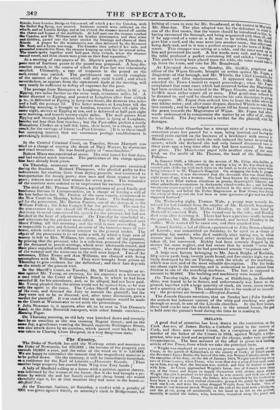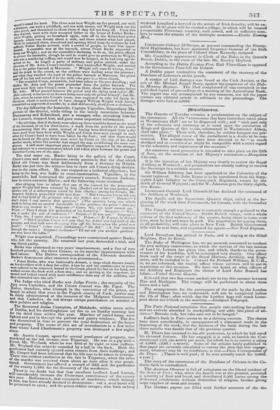IRELAND.
A good deal of attention has been drawn to the conviction, at the Cork Ass:zes, of James Burke, a Catholic priest in the county of Cork, and three men named Crean, for a conspiracy to prove the murder of the father of the Creans in 1834, against Wright, a tithes proctor, who was tried and acquitted on the charge, under very peculiar circumstances. The best account of the affair is given in a leading article of the Times, from which we take the principal facts. "Wright was employed to serve a certain process against the goods of one Crean, in the parish of Kihnichael, in the county of Cork ; of which parish the Reverend James Burke, the hero of this tale, was Roman Catholic curate. la the execution of his duty, on the 4th of January 1634, Wright was driving away two of Creates cows, when Crean, who wore that day a gray friese coat, came up to him, saying that the business was settled, and that he wished to speak with him. As Crean approached Wright's horse, two of Cream's SUDO came out of the house arid began to supply themselves with stones, upon which Wright tho unfit it prudent to let them see he was armed, and took one of his pistols from his pocket. Crean, the father, who is described by his landlord to have been a man of a very violent character, grasped the pistol by the muzzle with one h nd, and with the other dragged Wright from his horse. One of the sons at that moment struck Wright on the side of the head with a bludgeon, and the pi ,tol, going off accidentally in his hand as he fell to the ground, mortally wanided the father, who, however, wrenched away the pistol and weed it mend his head. The three sons beat Wright on the ground, one with aodra, one with a pitchfork, and one with stones, till Wright took out his
bl
petotl,aad threatened to shoot them if they did not keep off. Upon this othe s rd, d went with their wounded father to the house of Father Burke ; Ze-w-'iri;h't, getting on horseback again, rode off to the Kihnichael police which wee distant about a mile, and there related what had passed. whIle-4eremained there, disordered and spitting blood from the violence he had .„ffrred, Father Burke arrived, with a crowd of people, to have him appre- k" ",-ndes. A constable was at the barrack, whom I'riest Burke requested to bring out Wright ' • and on the constable's declining to do so, the priest offered to protectthe constable, though he said he would give no protection to Wright, murdering ruffian, and would now be banged, as he had long ago de- .whove d'as a
t
o he. At length a party of military and police arrived, under the altion of Mr. Ache, Crean's landlord ; they handcuffed Wright, and carried him to the police barrack at Macroom. " Wright will soon be wrong, boys," laid the priest to the crowd, as the soldiers were leading away the prisoner ; &ad when they reached the yard of the police barrack at Macroom, the priest toot off his hat and waved it to the mob, who gave 1,a three cheers. "The wounded Crean, meanwhile, had been taken to his own dwelling ; and thither Mr. Ashe and the priest proceeded from the police barrack. The priest went first into Crean's room : he was there about three minutes before Mr. Ache. What passed between the priest and the dying man before Mr. Arlie entered, is known to no human being save only the priest himself; but Mr. Ashe, when he came into Crean's room, was requested to take his dying de- claration, which is understood to have charged -William Wright with having *omitted an unprovoked murder, by a shot deliberately jived from a distance.
The day following the homicide, Captain Vignolles, Stipendiary Ma- gistrate of the district, while riding in the lonely mountains between Dunmanway and Kilmichael, met a stranger, who, mistaking him for the Coroner, stopped him, and gave some important information.
"Ile told him, that if the body were taken up there would be found on the wrist of the deceased, or on his shirt.sleeve, a mark from the powder of the pistol, demonstrating that the pistol, instead of having been discharged from a dis- tance, must have been fired while Wright and Crean were near enough to each other for Crean's hand to have been burnt by the flash ; and that there would sue be found on the gray friese coat worn by Crean on the day of his death another mark, where the powder hail singed the nap, establishing the same con- alusion. A still more important piece of intelligence imparted by the stranger had reference to a communication which had taken place between the priest and Cornelius Crean, one of the Bons."
The trial came on, Burke being in the gallery of the Court. Crean's sons and other witnesses swore positively that the shot which tilled old Crean was fired deliberately from a distance by Wright. Burke was put into the witness-box to state old Crean's dying declara- tion to the same effect. He was stopped on a technical objection ; but
being in the box, was liable to cross-examination. Vignollest in the meanwhile, had instructed the prisoner's counsel, Sergeant Jackson, how to cross.examine Burke ; and the following scene occurred.
After obliging him to admit that one of the counsel for the prosecution against Might had been retained by him (Burke) out of his own pocket, and another out of a subscription raised by him (Burke) among his friends, Mr. Sergeant Jackson proceeded with him thus " Did Cornelius Crean tell you that lie had hold of the prisoner when his father was shot " Priest—" I don't think I can answer that question." (The question being one which tends to bring out an answer favourable to the prisoner, the priest " does not think he ran answer it.") Sergeant—" Come Sir, you must answer me." Priest—" Then I claim the protection of his Lordship." Sergeant—" Why, was it under the seal of confession ?" Priest—" It was not." Sergeant- " Then, Sir, I insist that you answer me." Priest—" It I must, he did tell mess." " Did Cornelius Crean tell you that his ,father also had hold of the prisoner, and that both were (Is aygi leg hint off his horse when the pistol was „fired?" " Priest" (after sonic hesitation)—" He did." (A low murmur through the court.) Sergeant Jackson—" I'll not ask you another question : you may leave the table.'
Wright was acquitted. Proceedings were commenced against Burke, who left the country. tie returned last year, demanded a trial, and was found guilty.
Burke was sentenced to two years' imprisonment, and a fine of two hundred pounds- the three Creel's, to six months' imprisonment with bard labour. The Dublin correspondent of the Chronicle describes Burke's demeanour after sentence was pronounced- " Priest Burke, who was fashionably dressed, a large cloak thrown loosely .on his shoulders with a deep fur collar, when he and his confederates in crime were ordered to be removed, bowed to the Court, placed his hat on his bead, and walked across the dock with a firm step and on getting to the trap-door, he turned and looked round with more indifference than any of the auditors, and then descended into the cell."
The Judge who tried Burke was Judge Perrin ; the majority of the Jury were Catholics, and the Crown counsel was Mr. Pigot. The
Tones, therefore, who triumph in the conviction of the priest, are bound to admit that even in the Popish county of Cork, justice may be fairly administered at the instance of the Mulgrave Government, and that Catholics do not always escape punishment on account of their politics and religion.
The Reverend Josias Crampton, of Malabede, within seven miles of Dublin had his dwellinghouse set fire to on Sunday morning last for the third time within this year. Matches of tarred hemp were lighted and put in through the parlour and pantry windows. The fire Was discovered in time to prevent the total destruction of the house and property. The scene of this act of incendiarism is a few miles from where Lord Charlemont's property was destroyed a few nights since.
Mr. Austin Cooper, agent for several gentlemen of property, was murdered on the 5th instant, near Tipperary. He was in a gig with a friend, Mr. 1Veyland, when he was fired at by eight or nine ruffians. Mr. Weyland was severely wounded by a ball in the back. Both the gentlemen had recently ejected some tenants from their holdings ; and Mr. Cooper had been informed that his life was to be taken in revenge. There was evident exultation at the fair in Tipperary, when the news of the murder was received there about an hour after it was perpe- trated. Government has offered a reward of 300/. and the gentlemen of the county 1,5001. for the discovery of the murderers. There is no doubt but that that excellent landlord Lord Lorton, will considerably increase the Protestant constituency of the county this year. Ballinantuck, that receptacle of murderers, which belongs to him, has been already doomed to destruction : not a mud hovel will be permitted to exist; and the priest-ridden savages, who have so long
rendered Longford a byword iu the annals of Irish ferocity, will be ex- pelled. In its place will be erected a village, in which will be located a respectable Protestant tenantry, well armed, and in sufficient num- bers to resist the attacks of the midnight assassins.—Dublin Evening Mail.



























 Previous page
Previous page